Kerry Shields worked in the healthcare industry before coming to U-M’s Ross School of Business for her MBA and has plans to return to it after graduation. So she was eager to find a MAP (Multidisciplinary Action Project) in a different industry, and was ecstatic when she learned she was part of the WDI-sponsored MBA student team working with the Relationship Coffee Institute and Sustainable Harvest in Rwanda.
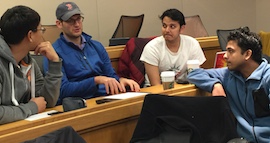
The Relationship Coffee Institute (RCI) is a nonprofit, public benefit corporation – or, B Corp – working to increase social and economic opportunity for smallholder commodity farmers and their families. Its partner, Sustainable Harvest, is one of the largest importers of fair trade specialty coffee in the U.S.
“What this company is trying to do is important and innovative and I can learn from that,” she said. “Hopefully we will have had an impact at the end of the project and get a better understanding how a private company can help alleviate poverty.”
The MAP in Rwanda is one of eight student projects organized and sponsored by WDI. MAP is an action-based learning course offered at Ross for MBA students who receive guidance from their faculty advisors. Each project requires analytical rigor, critical thinking, and teamwork. Sponsors receive top-notch deliverables and data-driven recommendations from the team of students.
After learning about their projects and conducting research in the classroom for several weeks, the students then spend three to four weeks working alongside their project sponsors in the field.
Sylvia Jimenez will work on a WDI-sponsored MAP team for CARE, a non-profit organization seeking to use business approaches to address social issues.
“I’m looking forward to getting out of my comfort zone and doing something different than I have done before,” she said. “I think I’ll learn a lot about me as a team player, and learn about my teammates and what their strengths are.”
Ted London, vice president of WDI’s Scaling Impact Initiative, is one of the faculty advisors on the Sustainable Harvest and CARE MAPs as well as two others. Before the teams traveled to their destinations for on-the-ground work, he brought them together for a special WDI-focused session to get to know each other better before they left and to touch on some of the key issues the teams will face in the field.
He discussed what it takes to conduct good interviews, particularly in a base of the pyramid (BoP) market context, emphasizing that the goal of these interviews is to develop data-driven recommendations. Among other things, he also told the students to approach people they meet and interview with respect and humility to maximize the depth and quality of the data collected during the interview.
“You are not only there as expert problem-solvers, but also as experts in learning and listening,” he said. “Only by collaborating and co-creating can we build solutions that really work.”
London said his MAP projects allow students to take what they learned in the classroom and apply it in a BoP context.
“For students interested in working in this space as a career, it is an amazing opportunity,” he said. “These MAPs open students’ eyes to this part of the world and to this scale of enterprise and impact. They’re part of the minority seeing how the majority of the world conducts business.”
WDI and its partners get value from the experience as well, London said. Seven of the eight MAP projects are with partners that have long-term relationships with WDI.
“By leveraging MAP and the great skills of the Ross students, we’re providing resources and expertise to our partners to help them solve the problems they’re facing,” London said. “And it’s a way for us to collaborate with partners in the field, apply our knowledge, and learn what are the next-generation tools we need to think about in the future.”
Here is a summary of each MAP project:
Aravind Eye Care System – India
Advised By: Paul Clyde, WDI and Ross School of Business; Peter Lenk, Ross School of Business
MAP Team: Jackie Barnum, Katie Redman, Alex Kravitz, Matt Tafoya
Aravind Eye Care System (AECS) has five tertiary care centers, six secondary care centers, six community clinics, and 54 primary eye care centers across the Tamil Nadu state in India. Now AECS is expanding, opening tertiary hospitals in Chennai and Tirupathi in the next couple of years, and there are also plans to expand the services/facilities in the existing hospital units.
The student team will customize and test at two to three AECS facilities an existing process model that will measure performance of each unit and is understandable to everyone in the organization.
Cooperative for Assistance and Relief Everywhere (CARE) – India
Advised By: Ted London, WDI and Ross School of Business; Jane Dutton, Ross School of Business
MAP Team: Karina Cabanillas, David Chang, Takashi Takizawa, Sylvia Jimenez
CARE has been working in India for over 65 years, focusing on ending poverty and social injustice. Its overall goal is the empowerment of women and girls from poor and marginalized communities leading to improvement in their lives and livelihoods.
Most smallholder farmers, a vast majority of whom are women, have limited access to quality and affordable agriculture input, services, finance and technologies. The student team will develop a profitable and socially inclusive business plan that CARE can execute in 2016 that facilitates access for smallholder farmers to inputs and related services. This should be a commercially viable and financially sustainable approach that avoids donor dependency through the development of an agricultural input supply social enterprise in India.
Sustainable Harvest & Relationship Coffee Institute – United States
Advised By: Ted London, WDI and Ross School of Business; Ravi Anupindi, WDI and Ross School of Business
MAP Team: Stacey Nathan, Whitney Augustine, Erdem Eray, Grant Cowherd
Sustainable Harvest of Portland, Ore. is an importer of high quality, specialty grade coffees from smallholder farmers from 15 countries around the world. In 2012, Sustainable Harvest formed a nonprofit organization, the Relationship Coffee Institute (RCI), to help propagate its business model and advance farmer training. In fall 2015, in conjunction with RCI and 4,000 women farmers in Rwanda, Sustainable Harvest launched Question Coffee, which represents its fundamental goal to empower coffee farmers and foster sustainable supply chains. It is Sustainable Harvest’s first B Corp certified product throughout the entire value chain, meaning it’s a for-profit entity that includes positive impacts on society, workers, and the environment. Net proceeds from Question Coffee go to farmer training, which contributes to better quality, improved yields and increased income and wellbeing for coffee farmers at the base of the pyramid.
The student team will conduct research to identify Question Coffee’s value proposition to consumers, resulting in several specific, actionable recommendations on branding and marketing strategies. The team also will devise several recommendations and strategies for greater market penetration.
Relationship Coffee Institute (in partnership with Sustainable Harvest) – Rwanda
Advised By: Ted London, WDI and the Ross School of Business; Jane Dutton, Ross School of Business
MAP Team: Courtney Landy, Aaron Whallon, Juan Marino, Kerry Shields
For this project, the student team will test and evaluate the value of B Corp certification to see if it could improve the lives of smallholder farmers in Rwanda, and how it could be scaled or applied to other commodities.
Zemen Bank – Ethiopia
Advised By: Paul Clyde, WDI and Ross School of Business; Bob Dittmar, Ross School of Business
MAP Team: Dana Yerace, Max Jacobson, Florence Noel, Nicholas Mencher
Zemen is a commercial bank located in Addis Ababa, Ethiopia. Its vision is to bring new dynamism to the financial sector and the banking business in Ethiopia. It is interested in serving small- and medium-sized enterprises (SMEs). Using a banking scheme in which Ethiopians living in the U.S. could put a hold on some monetary amount in their bank account, Zemen would then access the account for a low interest loan for Ethiopian citizens starting or expanding a small business. The hold on the U.S. bank would be reduced as the loan is paid back.
The student team will develop the business case for diaspora SME loans and assess the prospects for scaling the program to a level that would interest Zemen Bank. If the scheme were deemed viable, then the team would formulate a plan for executing the program.
Imperial Health Sciences (IHS) – South Africa
Advised By: Paul Clyde, WDI and Ross School of Business; Ravi Anupindi, WDI and Ross School of Business
MAP Team: Amit Patel, Jennifer Paxton, Anuja Mehta, Aric Adams
IHS provides supply chain solutions to the public and private pharmaceutical markets in Africa. IHS and the Imperial Logistics group have adopted the Unjani project as its Corporate Social Responsibility project. Unjani aims to establish a network of nurse-owned franchise clinics in historically underserved communities across South Africa. It has 19 operating clinics with plans to add 25 more by May. The group will take over an independent, failing clinic.
The student team will assess the change in the failing clinic’s success level after instituting the processes, controls, training, and marketing of the Unjani franchise network. Examining the operational and environmental factors of the clinic, along with some financial analysis, will allow IHS to better understand why this clinic failed. That will help IHS further develop the Unjani concept and ensure successful clinics in the future.
ITC Ltd. – India
Advised By: Ted London, WDI and Ross School of Business; Venkatram Ramaswany, Ross School of Business
MAP Team: Nishant Agrawal, Kee Cho, Arun Prakash, Dave Teebagy
ITC is a major diversified Indian conglomerate. ITC’s e-Choupal initiative is enabling Indian agriculture to enhance its competitiveness by empowering Indian farmers through the power of the Internet. The initiative facilitates the two-way flow of goods and services in and out of villages, and describes itself as the largest Internet-based intervention in rural India by a corporate entity.
The student team will help ITC design the next version of e-Choupal. The team will deliver a report exploring how the first three versions of e-Choupal have created value and where further opportunities for value creation may exist. The team also will look into how other models of rural farmer engagement are being deployed in other developing countries, identify the various stakeholders impacted, and highlight how the proposed model creates value for them.
Aparajitha Foundation – India
Advised By: Paul Clyde, WDI and Ross School of Business; Jim Walsh, Ross School of Business
MAP Team: Jamyle Michael, Holly Price, Aaron Steiner, Meghan Sheehan
The Aparajitha Foundation is an arm of the Aparajitha Group. It is committed to the cause of creating transformational change in adolescents by using audiovisual technology to deliver life skills training to economically disadvantaged children in India’s Tamil Nadu state.
The MAP team will develop a complete business plan for entrepreneurship education, training and development. The model should be scalable so that it can be used across the country in the future.
WDI’s Scaling Impact Initiative is working with Walmart to chronicle what the retail giant has learned from its efforts to include small producers in global supply chains.
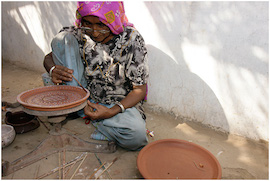
The successes, challenges, and lessons learned will become a policy brief and a teaching case, both written by WDI in collaboration with Professor Linda Scott of Oxford University’s Said Business School. Both documents will be published this spring, and are geared toward Walmart and other retailers looking to develop more effective sourcing programs in the future.
WDI Vice President of Scaling Impact Ted London and Research Manager Colm Fay, along with Scott, are studying two Walmart programs.
One is Empowering Women Together, which sources handicrafts from women-owned base of the pyramid businesses in East Africa, Nepal, India and other emerging markets to sell online. The other is Direct Farm, which buys fresh fruits and vegetables from small- and medium-sized farmers to supply Walmart’s stores in Central and South America, Mexico, South Africa, and India.
The team has interviewed managers from Walmart, the Walmart Foundation, and their implementing partners.
This is the second collaboration between WDI and Walmart. Last year, WDI Publishing released a case study on the evolution of a global cross-sector partnership between Walmart and the United States Agency for International Development (USAID). The case looked at what had been gleaned – both positive and negative – during the 15-year collaboration between the two organizations.
The free case, “Walmart and USAID: The Evolution of a Global Cross-Sector Partnership,” focused on partnerships that sought to engage smallholder farmers in the developing world, and highlighted examples from Honduras, Guatemala, Rwanda and Bangladesh. It explored the ways in which these collaborations came about, how they were supported by the partners, and the level of success achieved as measured by Walmart, the Walmart Foundation, and USAID.
The case also identified lessons learned for the future of the Walmart/USAID collaboration, and insights that may apply to the development of public-private partnerships for development more broadly.
In addition, NextBillion’s Kyle Poplin wrote a post on how the case was developed. And Beth Keck, senior director of Women’s Economic Empowerment at Walmart, sat down for a video interview with WDI’s London about the company’s global work.
Image courtesy of Navel Zaveri/Flickr.
Note: This is one in an ongoing series of articles profiling past WDI interns and Multidisciplinary Action Project (MAP) team members and their career paths. Additional profiles in the series may be found here.
With an engineering degree in hand, Patricia Griffin said she was probably destined for a job at an auto plant. But while studying for her MBA at Michigan’s Ross School of Business in 2009, she was part of a WDI-sponsored student team that traveled to a Ugandan hospital.
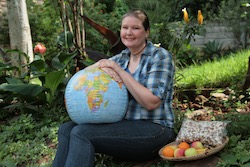
The experience changed her life – and the course of her career.
As part of the project, Griffin examined Kumi Hospital’s inventory management system and saw that it often ran out of life-saving drugs. She worked with the drug warehouse clerk on some basic supply chain management principles.
“In a matter of seven weeks, the hospital had stopped stocking out of essential medicines and patients stopped dying,” Griffin said. “At that point I realized my skill set was valuable and rare in this part of the world and I could either go back to the auto industry to eke out two seconds of additional productivity on an assembly line or return to Africa and save lives. The right choice was obvious to me.”
After earning her MBA, Griffin took a fellowship with LGT Venture Philanthropy working with Bridge International Academies in Kenya. She also oversaw operations at a nonprofit that partnered with local, smallholder farmers in Kenya to grow trees as a cash crop, and served as an adviser for more than a dozen health entrepreneurs in Kenya and Ethiopia for the global development firm Abt Associates. These work experiences helped Griffin discover where she could best contribute.
In 2014, she started her own company in Kenya – Inagape – that buys fruit from local farmers, dries it, packages it and then sells it as healthy snacks under the name Snak Afya. Its first product is a dried coconut snack food available at Nairobi stores. Plans are to add a flavored coconut snack food and possibly bottled coconut water.
Running her own startup business, Griffin often harkens back to her experience at Kumi Hospital.
As part of the Kumi project, Griffin and three of her fellow MBA students also worked with the staff at Kumi to cut costs so the facility wouldn’t run out of money at the end of each month.
The student team, part of Ross’ Multidisciplinary Action Projects (MAP) for MBA students, divided expenses into four categories – transport, food, medicine and medical supplies.
“We did a deep dive to see how the money was really being spent,” Griffin said. “At the end of seven weeks, we were able to make several recommendations on cost-saving initiatives and even implement some of the ideas.”
One example was that the hospital had two separate pharmacies serving outpatients and inpatients, but only one set of staff that had to walk about 50 yards between both. The hospital wanted to hire a second staff but the MAP team instead created one pharmacy with two service windows. The solution saved the hospital time and money by eliminating the need to hire more staff and making better use of the existing staff’s time.
When Griffin revisited the hospital in 2013, the two-window pharmacy was still in operation. “We’d spent our last weekend in Uganda executing that cost-saving recommendation, so seeing it still intact and functioning was affirming,” she said.
One of the lessons Griffin learned at Kumi was to ask questions and never assume anything. Like, for instance, why two pharmacies?
“I happened to ask why there were two pharmacy rooms in the first place and the answer I received was nothing I could’ve imagined,” Griffin said. “Apparently, during the Ugandan civil war, guerrilla groups would raid the hospital at gunpoint for medicines to treat wounded fighters in the field. When all the medicine was stocked in one room, the entire inventory would be stolen. Cleverly, by separating the pharmacy into two rooms, they’d only lose half their stock.”
That story stayed with her. She also reflects on the advice she received from the late C.K. Prahalad, one of her professors at the time, about working at the base of the pyramid. Prahalad encouraged her to sense an opportunity and then take the leap of faith “with both feet.”
“When the going gets tough and I feel like giving up or throwing in the towel, I think back to the number of sacrifices I’ve made to successfully switch careers,” she said. “I also re-read the encouraging note that Prahalad wrote to me on the bottom of my final essay for his class. It reminds me again why I wanted this career in the first place.”
And she thinks back to the lessons from that WDI MAP experience.
“Questioning my assumptions and taking nothing for granted has become a basic mode of operation for how I conduct my career and life,” Griffin said. “That’s a direct result of the MAP experience.”
Speaker: Madison Ayer, Executive Chairman, Honey Care Africa Chairman & Co-Founder, Farm Shop.
Supply chains integrating low-income producers and consumers are subject to unique challenges – poor infrastructure, security concerns, informal regulations, and high costs are just a sample of factors. Yet overcoming these barriers can lead to long-term competitive advantage and positive economic impact on communities across the supply chain.
Speaker: David Griswold, President and Founder of Sustainable Harvest, Inc.
David Griswold, founder of the market leading Sustainable Harvest Coffee based in Portland, Oregon, reflected on growing business challenges to create authentic and scaled commodity supply chains which are sustainable and can impact the growers and rural communities in the developing world. In times of rapid industry consolidation, venture capital money and acquisitions in the specialty coffee industry, the question for the future of the coffee industry is: Do consumers really care about sustainability?
Joshua Kaufman, director of the Office of Evaluation and Impact Assessment at USAID’s U.S. Global Development Lab, spoke Jan. 20 on how innovation is needed in order to positively impact unprecedented global development challenges.
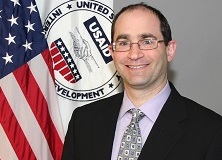
Kaufman was at U-M’s Ross School of Business as part of WDI’s Global Impact Speaker Series. Watch Kaufman’s presentation here.
Traditional development organizations must embrace radically new approaches if they expect to help the 700 million people who live on less than $2 a day lift themselves out of poverty, Kaufman said during his talk, “A 21st Century Approach to Development.”
“The global development problems of today are complex and require new ways of thinking and partnering,” said Heather Esper, program manager of WDI’s Performance Measurement Initiative (PMI). “That’s why we are excited to have Josh Kaufman share more on the work of the USAID Global Development Lab, which was created to address such challenges by convening diverse stakeholders to innovate and implement solutions.
We are also excited to be working with the lab in pioneering new and practical ways to assess hard-to-measure results within such complex systems and enable quicker learning and adaptive management from data.”
PMI is part of two consortiums that were awarded funding from the lab to test and implement innovative approaches to measuring development impact.
The consortiums seek to provide measurement solutions that depart from traditional approaches that can be overly rigid and often are slow to deliver results. Instead, the measurement solutions that will be tested by the consortiums seek to increase efficiency, efficacy and provide the ability to more quickly adapt to changing circumstances. (Read the full article on PMI’s work with the lab here. https://wdi.umich.edu/news/wdi-part-of-two-usaid-consortiums-to-innovate-new-approaches-to-measure-development-impact/)
The focus of the U.S. Global Development Lab, established in April 2014, is twofold: produce breakthrough development innovations by sourcing, testing, and scaling proven solutions to reach hundreds of millions of people; and accelerate the transformation by opening development to people everywhere with good ideas, promoting new and deepening existing partnerships, bringing data and evidence to bear, and harnessing scientific and technological advances.
Kaufman joined USAID in 1996. He previously served as the deputy director of the Office of Innovation and Development Alliances and worked for many years in the USAID Center for Democracy, Human Rights and Government.
Kaufman has a master’s degree in International Affairs from George Washington University, and a bachelor’s degree in Politics and Peace, Conflict and Coexistence Studies from Brandeis University.
Across 25 years and more than 80 countries, WDI Senior Research Fellow Ted London has explored the intersection of business development and poverty alleviation.
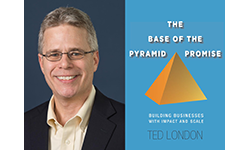
This includes deep involvement in the evolution of the base of the pyramid (BoP) beginning 15 years ago. At that time, the idea of the BoP was still considered a novel theory and the challenge was in helping the business and development communities see what was possible – that world’s poorest 4 billion people weren’t just recipients of donations, but active participants in a market economy.
Since then, he has engaged with and heard from leaders of many organizations claiming success, but not fully understanding what was and wasn’t working. London is now at the forefront of the next evolution of the development of the BoP domain – when the question has changed from “Should we invest in a BoP enterprise?” to “How can we make our investment in a BoP enterprise work better?”
For this latest phase, London has applied his accumulated research and knowledge for a new book. “The Base of the Pyramid Promise: Building Businesses with Impact and Scale,” published by Stanford University Press in 2016, was written with the specific goal of equipping enterprise leaders and their partners with the tools, frameworks, and actionable strategies to build sustainable and scalable BoP enterprise that truly alleviate poverty.
“I wanted to capture what we have learned by working with BoP enterprises,” said London, who also is vice president of WDI’s Scaling Impact Initiative. “While there is no guarantee for enterprise success, by better understanding the lessons from our successes and our failures, we can increase the likelihood of success.”
The book centers on three key components that enterprise leaders and their partners in the development and NGO sectors must integrate to achieve results: strategies for building sustainable, scalable enterprises; tools for enhancing value creation; and, frameworks for developing a robust and evolving partnership ecosystem.
“This book is based on 25 years of work,” London said. “We now know enough about BoP enterprises that we can, and indeed must, leverage the lessons learned along the way.”
London also was the co-editor and chapter author of the 2010 “Next Generation Business Strategies for the Base of the Pyramid” in which he and seven other leading BoP thought and practice leaders showed how to apply BoP innovations, techniques, and business models.
“What I hope is that entrepreneurs, enterprises, and others interested in learning more about how to build and grow sustainable enterprises – while simultaneously alleviating poverty – will find ‘The Base of the Pyramid Promise’ useful,” he said. “I think the book will have an impact, allowing more sustainable, scalable BoP enterprises to flourish. But it’s just one milestone in a long journey. There are more questions and issues to tackle in the future.”
At the end of 2015, NextBillion.net, WDI’s affiliated site focused on enterprise through development, held its annual “Most Influential Post of the Year Contest.”
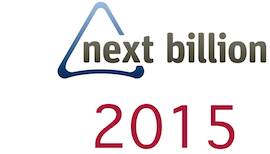
NextBillion re-published the top 12 most viewed articles (one for each month) the last two weeks of December and readers were encouraged to vote for the article that they found the most informative, insightful or inspirational in 2015. Find all the nominees here.
After all the votes were counted, the winners were crowned Jan. 5. Read about the first, second and third place winners here.
Heather Esper and Yaquta Kanchwala Fatehi, both of WDI’s Performance Measurement Initiative, wrote one of the 12 finalist articles. Read their article, “The State of Assessment: Why the ‘Assess or Not’ Debate Continues and How We Can Move Beyond It” here.
Business School for Impact (BSI) Initiative is a way to raise students’ awareness of the potential in developing countries.
The leader of two ventures in Kenya that serve those living at the base of the pyramid spoke Nov. 18 as part of the WDI Global Impact Speaker Series.
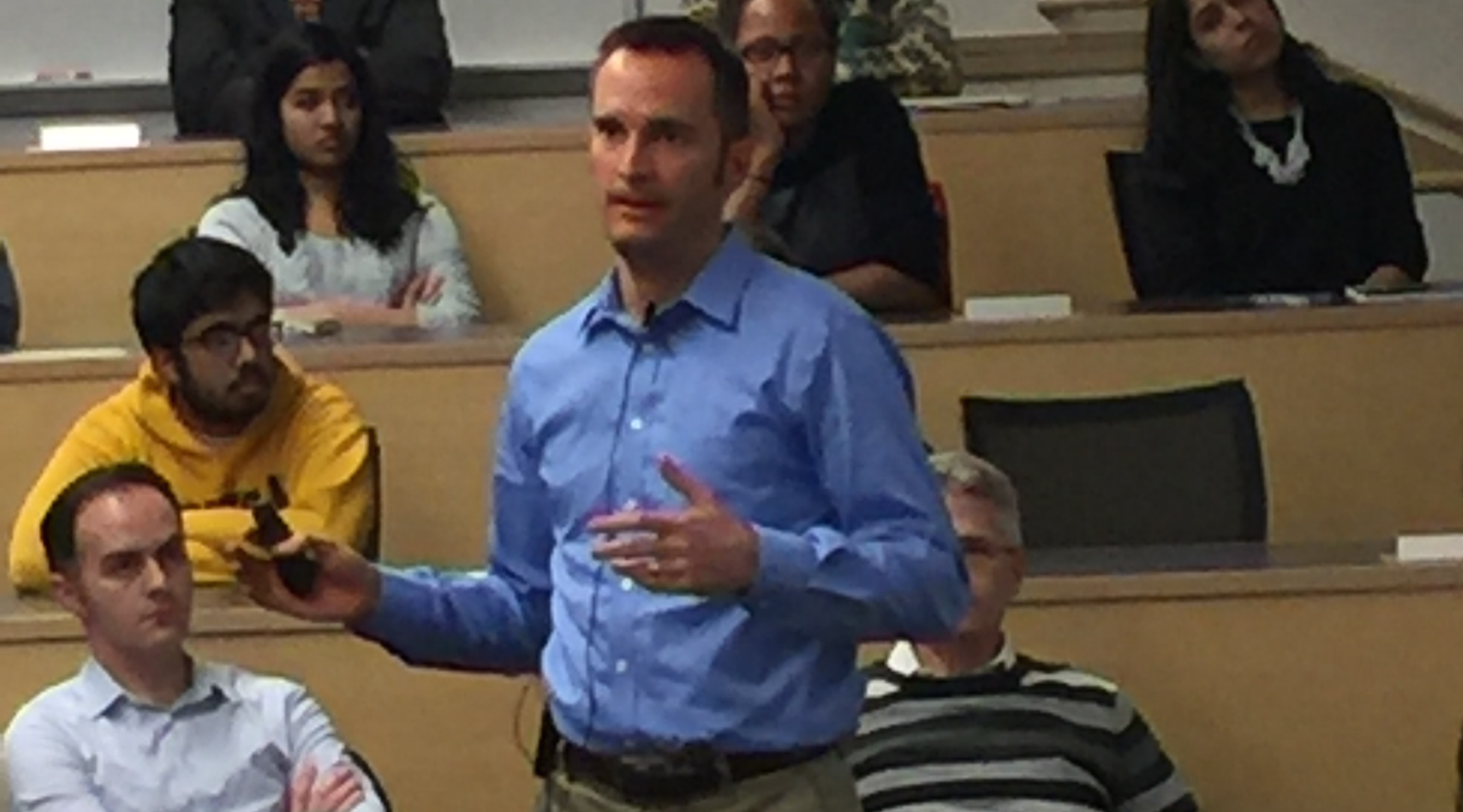
Madison Ayer, executive chairman of Honey Care Africa and co-founder and chairman of Farm Shop, talked about the unique challenges – including poor infrastructure, security concerns, informal regulations, and high costs – of integrating low-income producers and consumers into the supply chain. But, Ayer says, overcoming these barriers can lead to long-term competitive advantage and positive economic impact on communities across the supply chain.
Watch Ayer’s presentation here. Watch Ayer be interviewed by WDI Senior Research Fellow Ted London here.
“Madison is a successful entrepreneur who has turned his focus to base of the pyramid (BoP) markets,” London said. “He launched and subsequently exited two successful IT ventures in the U.S. In BoP markets, he helped turn around Honey Care, and then founded and led the development and growth of Farm Shop.”
Honey Care Africa supplies smallholder farmers with beehives and harvest management services. In addition, it guarantees a market for the beekeeper’s honey at fair trade prices, providing a steady, consistent source of income.
Farm Shop is a social enterprise that serves smallholder farmers across Africa. Farm Shop recruits and trains franchisees that then independently operate community-level agro-dealer shops that supply farmers with all they need to improve production, including seeds, fertilizers, tools and veterinary medicines.
WDI researchers have studied the two ventures in the past. As part of a project, funded by the German development agency GIZ, WDI studied the current landscape of BoP facilitators in the sub-Saharan Africa region. As part of this research, WDI’s Scaling Impact initiative conducted field visits to Ethiopia and Kenya – including the two ventures run by Ayer.
WDI’s Performance Measurement team also conducted a qualitative impact assessment in 2012 to identify the impact of Honey Care Africa on alleviating poverty on children age eight years and younger and developed a case study as part of the series entitled Focusing on the Next Generation: An Exploration of Enterprise Poverty Impacts on Children. The goal of the series, funded by the Bernard Van Leer Foundation, is to gain a greater understanding of the ways in which businesses in emerging markets impact young children’s lives and the potential to optimize impact on children. WDI also wrote and published a popular teaching case study on Honey Care Africa that examined the business’s transition from obligating farmers to maintain their own hives to providing hive management services. The case also explored ways to enhance this new model, including strategies to reduce side selling.
To watch a one-on-one video discussion with Ayer and London, click here.